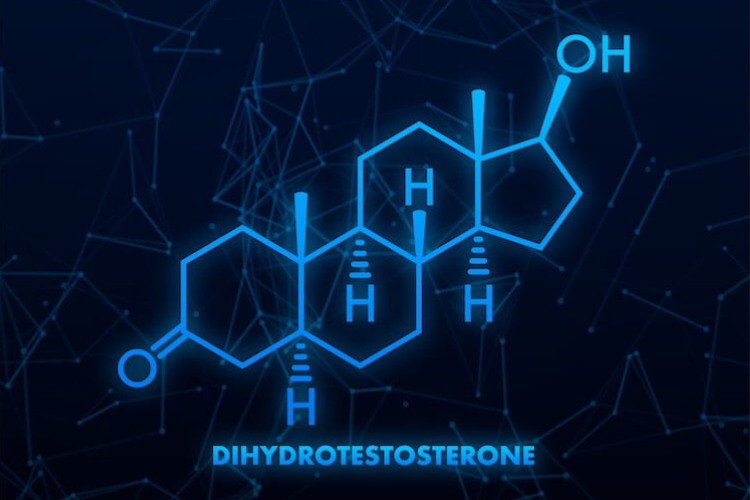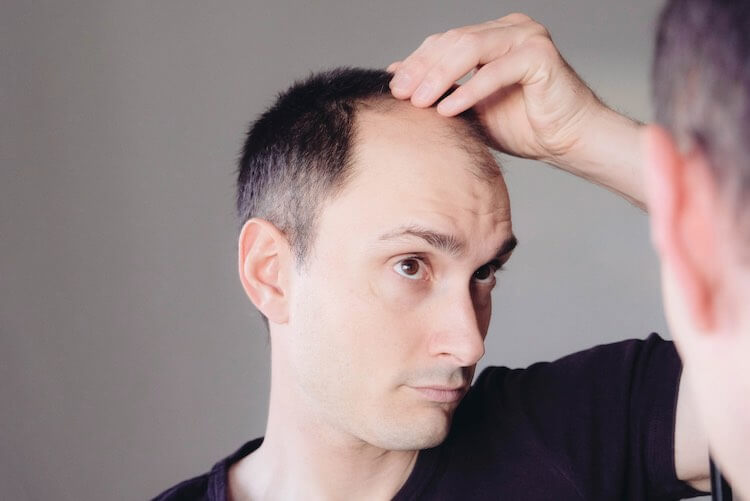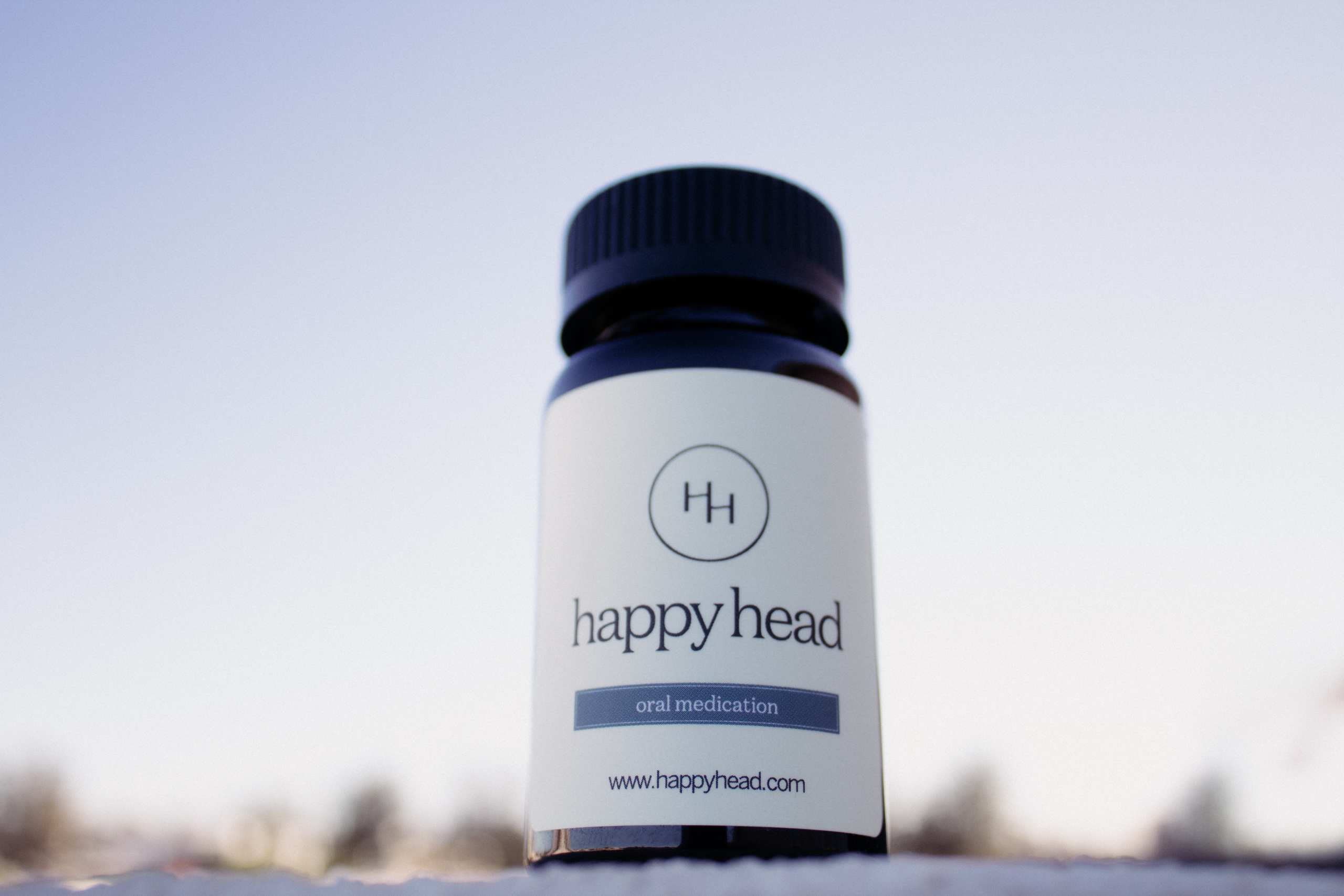What is DHT & Why Does It Cause Hair Loss?

Look into the causes of hair loss, and you’ll inevitably come across DHT, also known as Dihydrotestosterone. Whether you’re male or female, DHT is a likely cause of your thinning hair and bald spots. But what exactly is DHT? And why does it lead to hair loss?
What is Dihydrotestosterone?
Dihydrotestosterone (DHT) is a hormone produced in the body as a byproduct of Testosterone. DHT is formed when an enzyme called 5-alpha-reductase converts Testosterone into DHT. DHT plays a significant role in the formation of male characteristics, like facial hair, a deeper voice, and more muscle mass. Unfortunately, DHT is also responsible for hair loss in both men and women. (01)
How Does DHT Cause Hair Loss?
DHT bonds itself to hair follicles, causing them to shrink. The hair follicles then become smaller and smaller. Eventually, these follicles are unable to grow or hold onto the hair. This process is known as miniaturization, and it’s the primary cause of male and female pattern baldness. (02)
In addition to miniaturization, DHT encourages inflammation in the scalp, which further contributes to hair loss. This inflammation may damage hair follicles and prevent the circulation of nutrients, limiting the scalp’s ability to grow hair.
An excess of DHT also shortens the anagen (growth) phase of the hair cycle. Typically, hair grows for several years before entering a resting phase, after which it falls out and is replaced by new hair. However, when DHT attaches to hair follicles, it causes hair strands to enter the resting phase earlier than usual, resulting in shorter and thinner hair. (02)
Several other factors can contribute to the overproduction of DHT, including genetics, a person’s age, and hormonal imbalances. Men are also more likely to experience hair loss due to DHT because they have higher testosterone levels than women. However, it’s important to note that women can also experience hair loss due to DHT.
What are DHT Blockers, and How Do They Work?
Medications that block DHT’s effects belong to a category of drugs called Dihydrotestosterone blockers (DHT blockers) or 5-alpha-reductase inhibitors. The following are two of the most commonly used DHT blockers:
- Finasteride
- Dutasteride
DHT blockers work through four primary methods. (01)
- Inhibition of 5-alpha-reductase. DHT blockers work by targeting the production of DHT through the suppression of 5-alpha-reductase. This enzyme converts Testosterone into DHT. Therefore, by blocking this enzyme, DHT levels are reduced.
- Decreased DHT levels. By reducing DHT levels, DHT blockers help interrupt hair follicles’ miniaturization process.
- Extended hair growth phase. DHT blockers extend the active phase of hair growth called the anagen phase. DHT blockers prolong the anagen phase, allowing for longer, healthier, and thicker hair growth.
- Maintenance of existing hair. When hair loss occurs, protecting the hair that’s present is essential. DHT blockers can help maintain existing hair by preventing further miniaturization of hair follicles.
For the most part, DHT blockers are more effective for individuals experiencing androgenetic alopecia (pattern hair loss) because this condition is primarily influenced by DHT. Androgenetic alopecia can impact up to 50% of men and women. (03) Other types of hair loss can also be impacted by factors such as nutritional deficiencies or stress; these conditions may not respond as effectively to DHT blockers on their own. In these cases, a multifaceted approach may be required.
Why are DHT Blockers Prescribed for Hair Loss?
One of the primary reasons why DHT blockers are prescribed for hair loss is their effectiveness. DHT blockers work! Studies have shown that DHT blockers can significantly reduce hair loss and even promote hair regrowth in some cases. Because DHT is the primary cause of male and female pattern baldness, blocking its production can help to prevent further hair loss. (02)
Another reason why DHT blockers are prescribed for hair loss is their ease of use. Most DHT blockers are available in the form of oral medications, often taken as a once-a-day pill. This makes DHT blockers a convenient option for individuals who don’t want to use topical treatments or undergo more invasive hair restoration procedures.
DHT blockers are also considered to be safe and well-tolerated by most people. Unlike other hair loss treatments, DHT blockers typically do not have significant side effects. Their lack of major side effects makes them a popular choice for a safe and effective hair loss treatment (02)
Is Blocking DHT a Bad Thing?
Individuals looking into DHT blockers may have questions about whether blocking DHT is a bad thing. The production of DHT is a natural process. Therefore, doesn’t the body need DHT? Is blocking DHT a bad thing?
Although there is no cut-and-dry answer, blocking DHT is not inherently bad. However, as with any other medication, DHT medication does come with some side effects. These potential side effects must be considered when starting any DHT blocker for hair loss.
Because DHT plays important roles in the body, including the development of male sexual characteristics and other bodily functions. Therefore, blocking DHT can potentially affect these functions. DHT may cause: (02)
- Sexual side effects. Some individuals may experience sexual side effects when using DHT blockers. These side effects are generally rare but can occur in a small percentage of users.
- Hormonal imbalances. DHT blockers may cause alterations in hormone levels, resulting in changes in mood, energy levels, and overall hormonal balance.
- Prostate health: Because DHT is involved in the growth and maintenance of the prostate gland, blocking DHT can potentially affect prostate health. It’s crucial to discuss any concerns with a healthcare professional, especially if you have a history of prostate issues.
It’s essential to consult with a healthcare professional before starting any medication or treatment for hair loss. They can provide guidance based on your situation, conduct a thorough evaluation, and discuss DHT blockers’ potential benefits and risks.
Are There Different Ways to Target DHT for Both Men and Women?
While blocking DHT production is a common approach to treating hair loss and works for both men and women, the process may differ. For example, while oral DHT blockers like finasteride are primarily prescribed for treating male pattern baldness, they have been used off-label in some instances of female pattern hair loss. Therefore, women may benefit from DHT blockers for hair loss, but they must also consider the following when utilizing DHT blockers for hair loss.
Hormonal Effects
DHT blockers can affect hormone levels in the body, potentially leading to hormonal imbalances. Hormonal balance is particularly important for women, and altering hormone levels may have unintended consequences on various bodily functions. (04)
Pregnancy and Breastfeeding
Women who are pregnant or planning to become pregnant and those who are breastfeeding should avoid using DHT blockers. These medications can potentially interfere with fetal development and may have adverse effects on the baby.
While men typically require higher doses of DHT blockers to achieve effectiveness, a little goes a long way for women. This is because men have higher levels of Testosterone, which means they also have higher levels of DHT. In contrast, women have lower Testosterone levels and do not require the same amount of DHT blockers for effective hair loss treatment. Women may also benefit from using a DHT blocker topical, which may have a lower risk of side effects than an oral DHT blocker.
For women considering oral DHT blockers, it is crucial to consult with a knowledgeable healthcare professional, such as an experienced dermatologist or a hair loss specialist, who can thoroughly evaluate and discuss the potential benefits, risks, and alternatives. They can provide personalized guidance to help make an informed decision about the most appropriate treatment options for hair loss.
Are DHT Blockers Right for You?
Happy Head’s proprietary hair growth formula was crafted by the work of our world-renowned hair loss pioneers: Dr. Ben Behnam and Dr. Sean Behnam. Both our founders are widely published in the Journal of American Academy of Dermatology, Journal of Drugs in Dermatology, Journal of Organic Chemistry, Cutis, Expert Opinion in Pharmacotherapy & others. With Happy Head, you know you’re receiving high-quality and well-researched hair loss products with your safety in mind.
Every individual’s situation is unique. That’s why it’s essential to discuss the use of DHT blockers with a licensed dermatologist who can evaluate your specific situation, provide appropriate guidance, and monitor your progress. Happy Head’s experienced hair loss experts can help you determine the most suitable treatment options. Our experts can also walk you through each medication’s potential risks and side effects. Contact us to develop your individualized hair loss treatment today.
Resources:
(01) https://www.ncbi.nlm.nih.gov/books/NBK557634/
(02) https://www.ncbi.nlm.nih.gov/books/NBK555930/
(03) https://www.ncbi.nlm.nih.gov/books/NBK430924/
(04) https://www.ncbi.nlm.nih.gov/pmc/articles/PMC5419033/




